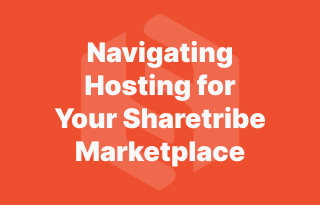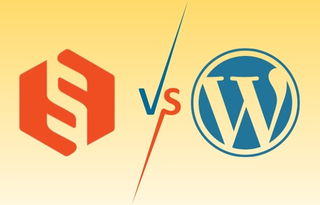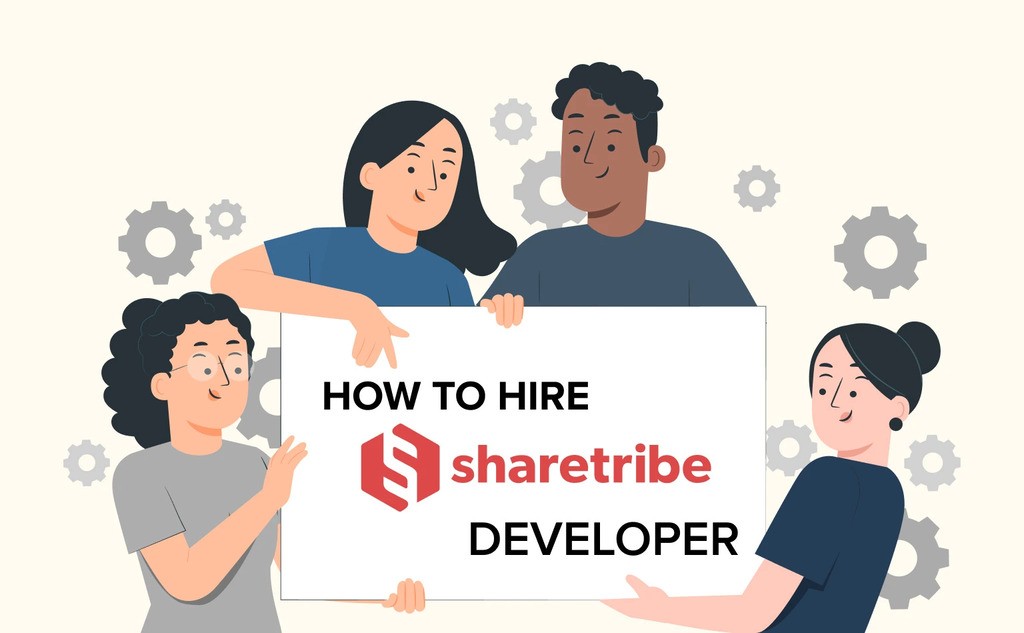
Building a marketplace isn’t a walk in the park. Sure, the tooling is better than ever. The internet’s practically overflowing with no-code builders, plug-and-play platforms, and “launch in a weekend” promises. But taking your marketplace idea and turning it into an actual product that people use, love, and pay for? That’s a different challenge entirely.
That’s where Sharetribe makes its entrance, and not quietly.
Unlike generic eCommerce platforms that try to bolt on multi-vendor features as an afterthought, Sharetribe was purpose-built for marketplaces. From day one. It’s not a hacked-together CMS or a bloated plugin stack. It’s a clean, powerful, API-first infrastructure designed to support the way real marketplaces operate.
But even with the right tech, there’s a gap between potential and performance.
Because a platform can give you building blocks - but not the vision, experience, or hands-on skill to assemble something that actually fits your business. Your marketplace probably doesn’t look like anyone else’s - your user flows, your commission logic, your brand identity, your growth goals, they all need to come together in a way that works for you.
And for that, you need to hire a Sharetribe expert.
Not just someone who can write code. You need online marketplace software developers who understand how marketplaces tick, and how Sharetribe can be pushed, extended, and fine-tuned to help you go from concept to launch, and from launch to scale.
In this guide, we’ll break down what Sharetribe is, how to hire a Sharetribe developer, who actually needs it, what to look for, how much it costs, and why Roobykon is trusted by marketplace founders all over the world.
So grab a coffee (or a whiteboard marker) and let’s dig in.
What is Sharetribe?
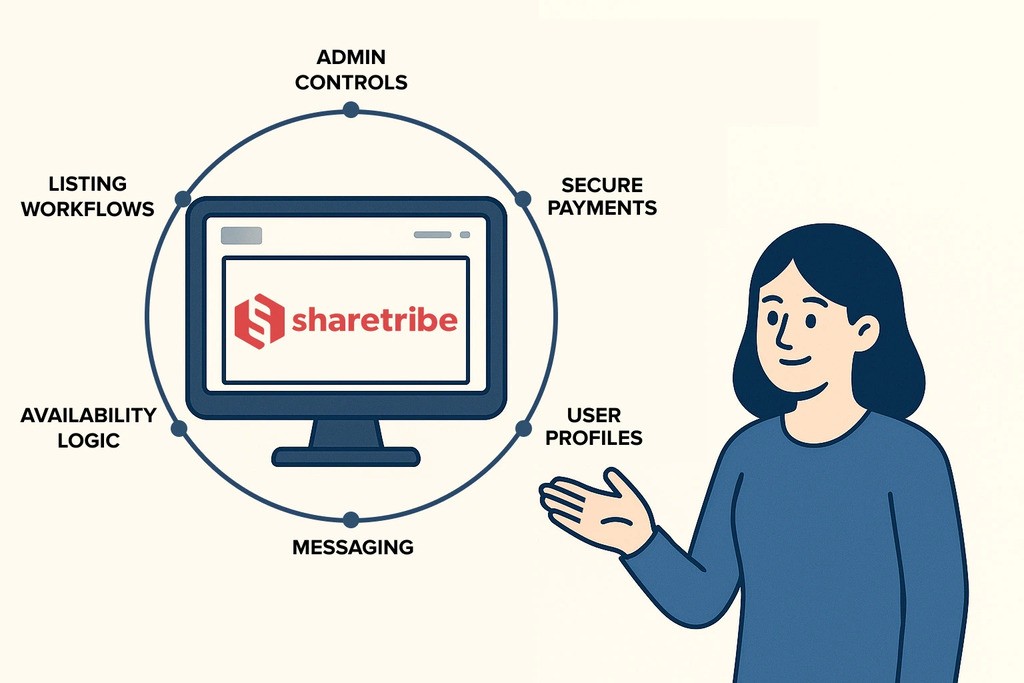
Sharetribe is purpose-built for launching and scaling online marketplaces, whether you’re creating a peer-to-peer rental platform, a services exchange, a B2B ecosystem, or a niche vertical no one’s ever tackled before. It’s not a CMS in disguise or a bloated eCommerce plugin. It’s a marketplace engine, designed from the ground up with modern development principles and real business needs in mind.
Out of the box, you get all the operational essentials: user profiles, listing workflows, secure payments, messaging, availability logic, admin controls - the core mechanics of any serious marketplace.
But the real strength of Sharetribe lies under the surface. It’s not a one-size-fits-all solution - it’s a highly adaptable development framework. The front-end is powered by React, while the backend is exposed via a clean, well-documented set of APIs. That means you can mold it to match your business logic, integrate it with your tools, and evolve it as your platform grows.
If Shopify is the go-to for product shops, think of Sharetribe as the go-to for marketplaces, but with the freedom to design, build, and scale on your own terms.
Who needs a Sharetribe developer?
You need to hire Sharetribe developers if you want to build a customized marketplace that goes beyond the basic templates, requires integrations with other services, or has unique business logic.
Let’s be honest, if you just want to spin up a bare-bones marketplace with zero custom features, you can do that yourself. Sharetribe’s default setup lets you go live in hours, not months.
But if you’re reading this, chances are you don’t want “bare-bones.” You want:
- a modern interface that reflects your brand
- a search flow designed around how your users think
- onboarding that doesn’t lose half your suppliers halfway through
- a payment setup that supports your specific business model
- real-time notifications, CRMs, analytics, shipping APIs - the works
Once you start needing anything beyond what the base platform offers, the question shifts from “Can I launch a marketplace?” to “Can I build the right marketplace?”
That’s where a Sharetribe marketplace website developer becomes essential. You’re bringing on a tech partner who helps bring your platform to life with purpose, precision, and future-proof thinking.
What does a Sharetribe developer actually do?
A Sharetribe multi-vendor marketplace developer customizes your marketplace’s design, behavior, integrations, and performance to meet your specific goals, both now and as you grow.
A skilled Sharetribe developer will:
- Customize the front-end: Whether you want a sleek, modern design, mobile-first layouts, or pixel-perfect UI aligned with your brand, the front-end is built in React and fully customizable.
- Tailor user flows: Registration, onboarding, listing creation, checkout - these flows matter. A good dev helps design and implement flows that reduce friction and drive engagement.
- Add custom logic: Need multiple commission types? Tiered pricing? Complex availability rules? No problem. Sharetribe’s API layer can support it with the right dev.
- Integrate external services: Stripe? Shippo? Zapier? HubSpot? Yes, yes, and yes. A dev will help you plug these into your marketplace smoothly.
- Optimize performance: Speed matters. A sluggish marketplace bleeds users. Developers can tune performance, caching, and responsiveness.
- Ensure technical scalability: Starting small? Great. But a good Sharetribe dev builds with your roadmap in mind, so you’re not locked into a fragile MVP when growth comes knocking.
And don’t forget the operational side: from helping you set up hosting to guiding your migration from Sharetribe Go to the new Sharetribe platform, a well-rounded Sharetribe developer (or team) supports much more than just feature development.
In short, they’re part builder, part strategist, and part safety net.
Where to find a Sharetribe developer?
You can find Sharetribe developers through Sharetribe’s official partners, boutique, or via freelance developer networks, though quality and reliability can vary wildly.
But let’s cut to the chase. Roobykon is one of the most experienced Sharetribe online marketplace developers out there. We’ve helped dozens of marketplace founders launch, pivot, and scale across industries. We know the platform inside-out and back-to-front.
What to look for when hiring a Sharetribe developer
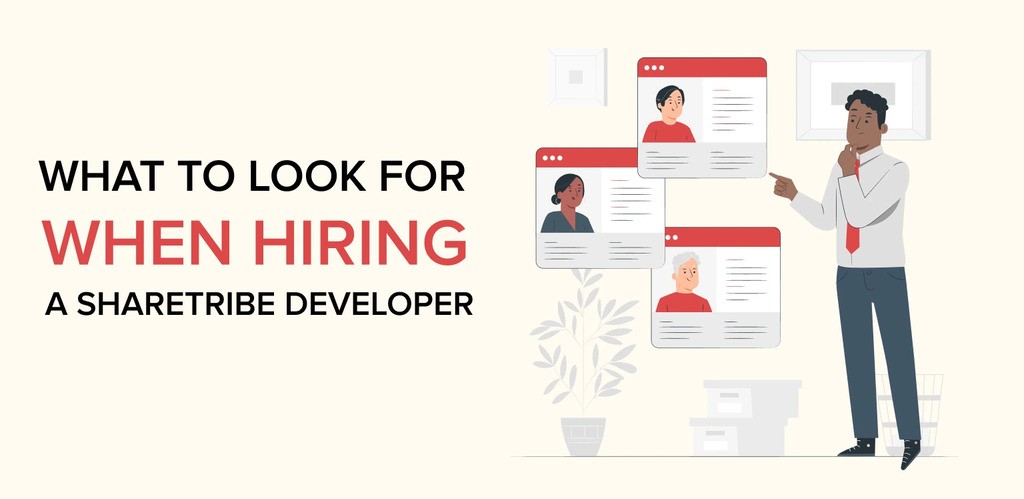
When hiring a Sharetribe developer, look for technical skills and strategic thinking. Experience with marketplaces, React, APIs, and agile workflows is a must.
Here’s what to check off:
- Marketplace experience: Have they worked on marketplace platforms before? Ask for examples.
- Strong front-end skills: They should be fluent in React and understand how to build performant, responsive UIs.
- API integration know-how: Can they connect external tools cleanly? Stripe, CRMs, analytics, email marketing, etc.?
- UX sense: Do they just code what you say, or do they help improve the experience for buyers and sellers?
- Communication: This is a partnership, not a one-off gig. You need someone who asks questions, suggests better paths, and collaborates well.
- Honesty and planning mindset: A good partner explains what’s involved, highlights complexities early, and guides you through decisions with full transparency.
Also, if you want a Sharetribe open-source expert, don’t forget the backend side of things. While Sharetribe handles a lot under the hood, larger builds often involve backend extensions or external services. That’s where our Node.js expertise comes in. Since Sharetribe’s backend is built on Node.js, they provide a streamlined and supported way to extend core functionality, and we know how to work within that architecture.
Common mistakes when hiring Sharetribe developers
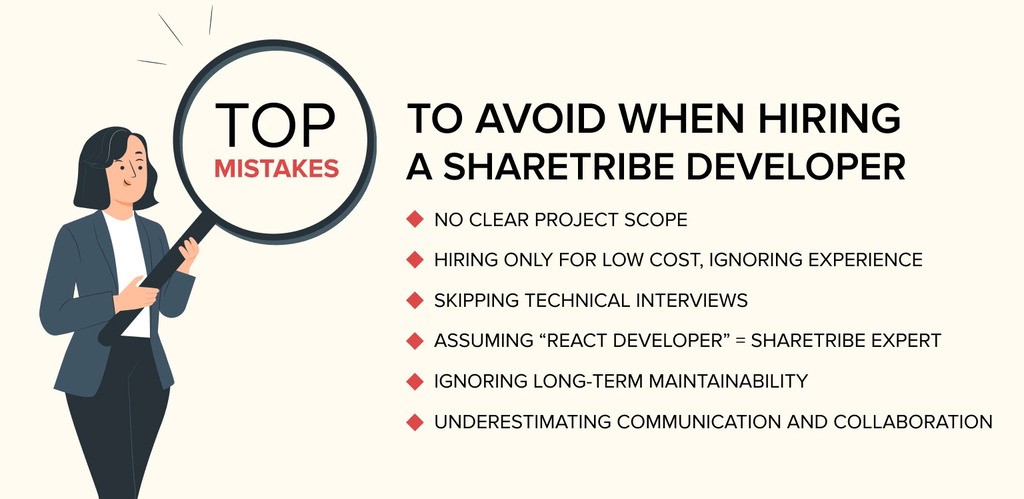
Hiring the right multivendor marketplace developer isn’t just about reviewing resumes or scrolling through Upwork profiles. It’s a high-stakes decision that can either set your marketplace up for growth… or bury it in tech debt before your first users ever log in.
Top mistakes to avoid when hiring a Sharetribe developer:
No clear project scope
Hiring a Sharetribe specialist without a well-defined scope is like hiring a chef without deciding what’s for dinner. You’ll end up spending time and money, and still walk away hungry.
Before you even post a job or reach out to an agency, take the time to get specific about what you need:
- What kind of marketplace are you building (rental, services, B2B, etc.)?
- What’s your MVP feature set?
- What’s out-of-the-box vs. what needs to be custom-built?
- What integrations or third-party tools do you plan to use?
A developer can’t give you accurate timelines, quotes, or architecture recommendations if you don’t have this nailed down. If you’re not sure where to start, that’s where someone like Roobykon can step in and help you shape the scope strategically, before writing a single line of code.
Hiring only for low cost, ignoring experience
We get it - budgets are real. But if your #1 criteria on how to hire Sharetribe developers is “who’s the cheapest,” you’re almost guaranteed to pay for it later. Sharetribe development isn’t basic CRUD work. It involves complex user roles, transactions, trust-building UX, search logic, availability systems, and often tricky integrations. You don’t want someone learning on your dime, or worse, hacking something together that will collapse when you try to scale.
Here’s a good rule of thumb: hire for outcomes, not hourly rates. An experienced Sharetribe partner will finish faster, make better decisions, write cleaner code, and reduce future maintenance costs. That’s ROI you can’t measure just by comparing bids.
Skipping technical interviews
A Sharetribe developer might “look great on paper,” but unless you actually assess their skills, you’re taking a gamble. And in the world of custom marketplaces, the cost of redoing work is high.
You don’t need to grill them with whiteboard algorithms. But at the very least, ask for:
- Examples of past Sharetribe projects
- Walkthroughs of challenges they solved (UX, logic, performance)
- How they approach API integrations
- How they keep code maintainable across iterations
And if you don’t have the tech chops to evaluate their answers, bring in someone who does. Or partner with a trusted dev team (like us!) that’s already battle-tested.
Assuming “React developer” = Sharetribe expert
This one happens a lot. Sharetribe’s front-end is React-based, so founders assume any React developer can jump in and build magic. Here’s the truth: React is just the tool. Sharetribe is the system. A Sharetribe developer needs to understand:
- How Sharetribe’s APIs are structured
- What’s customizable and what’s not
- How marketplace logic differs from typical apps
- How to build secure, scalable user workflows
- How to debug Sharetribe-specific behaviors (especially with transactions and availability calendars)
So yes, React knowledge is necessary - but it’s only one piece of a much bigger puzzle.
Ignoring long-term maintainability
Let’s say you hired someone, got the job done, and launched your MVP. Great. But what happens three months later when you want to:
- Add a new payment flow?
- Switch CRMs?
- Change how listings are filtered?
- Redesign the mobile view?
If your codebase is spaghetti (rushed, undocumented, and full of shortcuts) these updates become a nightmare. You’ll either chase down the original developer (good luck) or pay someone else to unravel it all.
That’s why it’s critical to prioritize clean architecture, good documentation, and a team that thinks beyond the short-term launch.
Underestimating communication and collaboration
Hiring a great dev is about how they work with you, how they understand your business model, raise the right questions, suggest better paths, and deliver consistently.
Especially in remote setups, strong communication isn’t a “nice to have” - it’s the backbone of a healthy project. You need a developer (or team) who:
- Updates you regularly
- Flags roadblocks early
- Documents decision
- Communicates clearly and without jargon
That’s why at Roobykon, we don’t just ship code. We build partnerships, the kind that make your job easier, not harder.
Roobykon Software is the best partner of Sharetribe
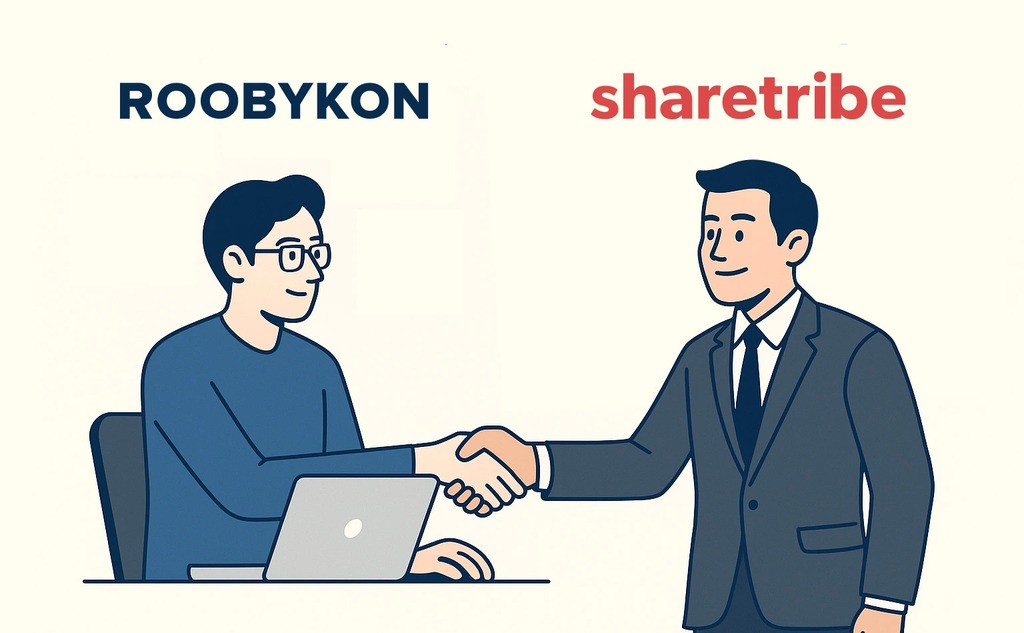
Roobykon has been in the Sharetribe game since the beginning, and we’ve built marketplaces that work.
Here’s what we bring to the table:
- Deep platform knowledge: We’ve worked on Sharetribe projects across industries: travel, rentals, B2B services, education, and more. We’ve been hands-on through every phase of Sharetribe’s evolution, including the new Sharetribe, which unlocks more power, flexibility, and developer freedom than ever before.
- Full-cycle support: From scoping and UX to development and launch, we don’t just drop code and disappear.
- Real collaboration: We speak product. We ask questions. We challenge assumptions. Because that’s how better platforms get built.
- Growth-minded thinking: We build for where you’re going, not just where you are today.
And most importantly, we’re humans who care about your product as much as you do.
If you're serious about building a Sharetribe marketplace that stands out, one that's fast, flexible, and future-proof, let’s talk.
FAQ

FAQ
1. Can I build a marketplace on Sharetribe without a developer?
Yes, you can, but only to a point. Sharetribe offers a solid default setup with ready-to-use features like listings, messaging, payments, and basic admin tools. If your marketplace idea is relatively simple and you don’t need custom logic, branding, or integrations, you might be able to launch a minimum viable version yourself. However, as soon as you need to tailor user flows, add unique business rules, or connect with third-party tools, you’ll quickly hit the limits of no-code. That’s where a developer (or a product-focused team like Roobykon) becomes essential.
2. How long does it take to build a Sharetribe marketplace?
It depends on your scope. A basic, lightly customized marketplace can be up and running in 4-6 weeks, especially if your requirements align closely with Sharetribe’s default capabilities. For more complex builds (with custom onboarding, third-party integrations, advanced search logic, or tailored transaction flows), timelines often range from 8 to 16 weeks. The good news? Sharetribe’s modular approach means you can launch earlier, then iterate fast.
3. Is Sharetribe suitable for large-scale marketplaces?
Absolutely, with the right development approach. Sharetribe is built on scalable infrastructure, and its API-first architecture is designed for extensibility. Many of our clients use it to power serious, high-volume platforms with thousands of users and transactions. The key to scalability lies in how well your custom features are architected - performance, security, and maintainability all matter here.
4. What’s the difference between a Sharetribe developer and a general web developer?
A Sharetribe developer understands the platform inside out, including its API structure, data model, front-end SDK, transaction engine, and deployment workflows. More importantly, they understand marketplace logic - how to manage two-sided interactions, listings, trust flows, and complex user behaviors. A generalist React or full-stack developer may know the language, but not the nuances of how a marketplace actually functions. That difference can make or break your platform experience.


